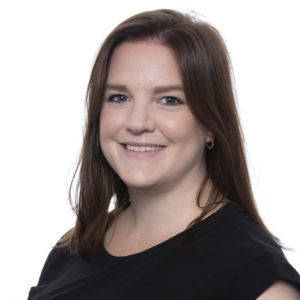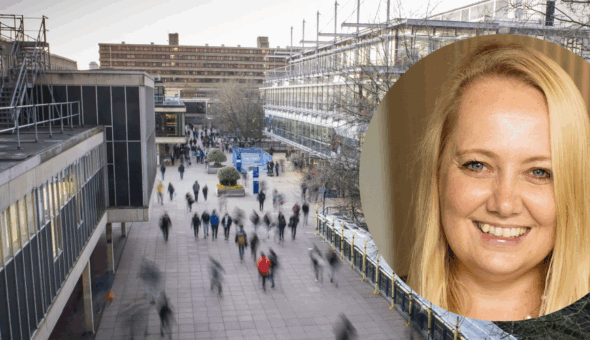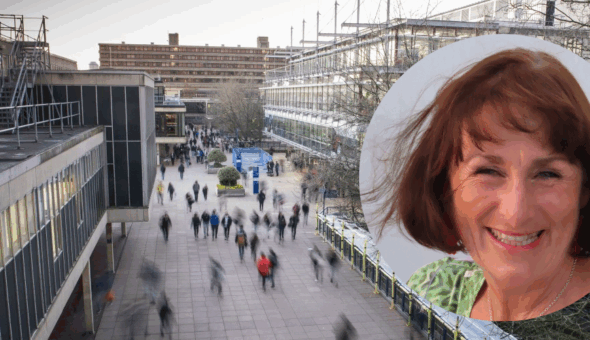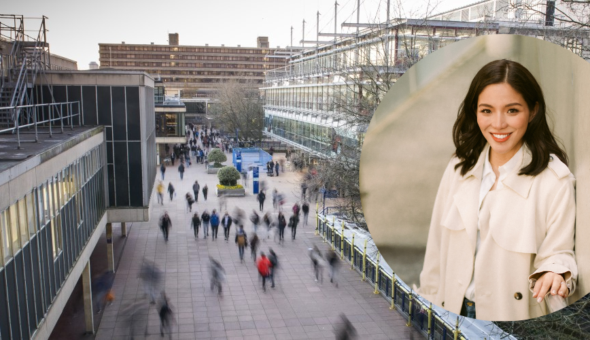After leaving university, Aisling started a career in higher education and is now Associate Director (Supporter Engagement) at the University of Bath. She tells us about teaching in Uzbekistan, working at the Olympics and spraying prosecco by the lake...
 Why did you choose to study at Bath?
Why did you choose to study at Bath?
After school I decided to study English. That didn't work out – I missed doing languages, history, politics and all of that – so I dropped out, had a year out and reapplied. Bath was one of the only places where I could do two languages and still have the wider cultural angle.
Did you have a particular career in mind when you chose your course?
When I was a kid, I wanted to be a teacher, but very quickly realised I didn't actually want that. I had an idea of going into the Civil Service and working overseas using my languages, but because I spent so much of my life abroad growing up, having the stability of living in one place and being able to visit my family whenever I wanted was more appealing in the end, so I didn't really know what I wanted to do.
Can you tell us about your experience of studying here? Any favourite memories, or places to go on campus and in the city?
By the time I got to Bath, I was a few years older than everyone else in my year, so I felt a little bit separate and different. I struggled living in halls, but once I could live in the city, things got much easier. Bath is such a beautiful city, so I loved having that freedom to get the bus up to campus when I needed to, but then wander through the lovely Georgian streets.
There was a coffee shop on George Street called Jika-Jika, and it was the best. I used to go there all the time in my second and fourth years – I lived just up the road. They did the best iced coffee and I used to sit in there for hours and study.
On campus, obviously the lake is iconic. I remember when we finally finished exams – we were the last set to finish – celebrating and spraying prosecco everywhere by the lake with the rest of my class.
Describe your career journey since graduating. What is a typical day like in your current role?
I graduated in 2012 and then volunteered at the Olympics and Paralympics for that whole summer. It was genuinely the best time I've ever had: I was the team assistant for Ecuador at the Olympics and for Argentina at the Paralympics. I was right in amongst the action, using my languages, and it was brilliant. After that I thought: what am I going to do now?
My mum worked in an independent school in Kent and she said they needed help in their development office for a few months. Nearly a year later, I was still there as Development Assistant, organising events and working on fundraising campaign initiatives. I really enjoyed it and wanted to carry on doing that sort of thing.
I ended up in Cambridge at St John's College and worked my way up to become Head of Alumni Relations there. I learned an awful lot and then I moved to the wider University, where I was Alumni Engagement Manager for four-and-a-half years.
After that, I wanted to try something different, so I ended up working for a conservation charity for nearly a year. After a brief detour to Brighton, I finally made it to Bath and it's very nice to be back.
I've only been in this role for about six weeks, so I'm not sure that a typical day now will be a typical day in a year. At the moment I’m getting to grips with who our alumni are and what we offer them, getting to know my colleagues, and meeting some of our key supporters and academics. I’m looking to the future and working out what things could be like. We have such a warm, engaging and connected community with so much potential. I'm really excited to get planning.
How did your studies help you to develop? If you took part in a year abroad, can you talk a bit about that experience?
I've always loved languages. I think exposure to lots of different languages and their cultures, history and politics gives you a greater understanding of how to communicate with different audiences, makes you more adaptable and makes you more flexible.
For my year abroad, I think I was the first person ever to go to Uzbekistan from the University. I was a teaching assistant in a British school, which cemented that I didn't want to be a teacher but was an incredible experience. It was so different to anything my friends were doing: they’d gone off to study in Paris or Madrid, and I was in Tashkent teaching in a nursery school.
From a life perspective, I feel like I gained an awful lot from being in a place that felt a lot more remote. It wasn't somewhere I could come back from just for the weekend if I was feeling a bit homesick!
What advice would you give to prospective students thinking about studying Modern Languages at Bath?
If you're considering studying languages and politics or international studies, do it. It's a fantastic department; it's so hands-on. I have friends who have been to other universities to study languages, but they didn’t get the same rounded education that you get at Bath.
I still have fantastic friends from my time here, and I really hope l can reconnect with some of the other people I knew through this job. I know some of them are doing incredible things, so I'd love to hear from them. It really is an amazing community.
Also, seize every opportunity, because you might never get to go to Uzbekistan otherwise!
Respond



